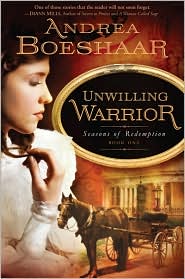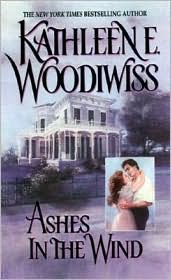By Andrea Boeshaar
Research for a historical fiction novel has to move beyond watching Little House on the Prairie reruns. For instance, men in the late 1800s didn’t necessarily wear 1970-style haircuts. While the movie Sarah, Plain and Tall may be historically accurate on many levels, authors need to remember that women in the 19th Century didn’t have eyeliner and lipstick. They were, in fact, more “plain” than the way actress Glenn Close appeared in the flick.
In researching the antebellum period for my latest novel Unwilling Warrior, I read A Diary of Dixie by Mary Chestnut and Sarah Morgan’s The Civil War Diary of a Southern Woman. I also studied books about photography process and purchased Mathew Brady’s Civil War, a collection of photographs from the Civil War. I also watched Ken Burns’ documentary about the American Civil War (PBS Home Video). Many of Mathew Brady’s photographs appear in the film. I also perused Shelby Foote’s expert texts on the Civil War and Michael J. Varhola’s Everyday Life During the Civil War (Writers Digest).
In addition, I used the Internet in my research. This can be unreliable because
anyone can put
anything up on a website. Bestselling author
Tracie Peterson once told me a good rule of thumb is to find three different sources on a particular topic. If your references say the same thing, the info is likely reliable.
For instance, I found a site that had good information about fashion during the Civil War. I scoured the site and then read
Godey’s Ladies Book, which is in my personal library, but found, to some degree, online as well, and I discovered the two sources said largely the same thing, except that
Fanny & Vera’s site had more details about creating Civil War/Victorian costumes for reenactments and such. Then I found a third site,
Garments by Glenda where one can actually purchase outfits for reenactments. It’s not just a
sew-it-yourself kind of site. To me, as a historical fiction author, learning details surrounding fashion of the time period in which I’m writing allows me to add realistic description. Thus, I’ve found these two sites along with Godey’s to be valuable resources.
Besides the Internet and my ever-growing personal history book collection, I found the public library to still be a treasure trove of great information. Many references via the public library can be accessed online with a valid library card.
Why historical fiction?
For me, I’ve been enthralled with history ever since I was a girl in junior high. As a family we toured the battlefields of
Gettysburg and
Vicksburg. My father worked in the
University of Wisconsin’s Social Work Department and was a Civil War enthusiast. His interest rubbed off on me. I imagined myself a Southern young lady, hoping, praying that our soldiers would come back safely from battle. (I even wrote that last line with a Southern drawl in my head!) Basically, I believe it’s the Southern chivalry that enchanted me. Old fashioned, gentlemanly manners were something I never experienced, growing up in
Milwaukee, Wisconsin during the ‘60s and ‘70s. My father worked hard at correcting social injustices and my mother was a feminist. (God forbid any man dare hold the door open for her!)
When I was in junior high school my family and I visited friends in the
New Orleans area. The memories of those trips will linger forever. I felt mesmerized as we toured sprawling plantations. While I was appalled by the idea of slavery I couldn’t help but appreciate the beauty of those majestic places. The wide lawns, tall oaks, weeping willows and the verandahs. As an awkward pre-teen I pictured myself all grown up, wearing a silk ball gown with its full hoop skirt, accepting the hand of a gallant young man. Together we’d waltz across the mansion’s polished ballroom floor.
Which brings me to my next point. No reference book can replace personal experience. As historical authors we, of course, cannot go back in time – even if our characters do. But visiting restored plantations and viewing reenactments can be very inspiring – almost like you’re really there. If your chosen time period is World War II, for example, it might also behoove you to interview surviving veterans. Same with the
Vietnam era. I have actually recorded my interviews with my grandfather’s cousin who served win WWII. Those are firsthand accounts.
Personal experience.
But as historical novelists, we’re not after textbook drama. We want to impart that willing suspension of disbelief to our readers. That involves imagination.
And here’s where
Hollywood can play a part in research. For instance, I’ve seen the movie
Gone With the Wind only about 49 times. Novelists are warned about the GWTW factor and how historically inaccurate the movie is, and I agree. But I must admit that watching the story unfold on screen evokes my imagination. As a teenager, seeing GWTW fueled my romantic interest in the antebellum era.
And then, as a young mother, I read Kathleen E. Woodiwiss’s Ashes in the Wind. The novel is one of my favorite stories of all time. I fell in love with the handsome Yankee Army surgeon and sympathized with the deceitful Southern girl on a mission who blossomed into a beautiful woman. I knew I wanted to write a story just as powerful and beloved.
And yet, one that was very different.
In 1991, I gave my heart to Jesus Christ. Soon after, I realized I was call to write Christian romance. My world changed. My writing changed. But my desire to write a romance set during the Civil War remained.
In 1994 my first novel was published. A grand attempt. But due to word length constraints, the story was only a shadow of what I really had wanted to create.
Sixteen years later, I was given my chance to write the story that’s lurked in my heart for nearly four decades. The first novel in my Seasons of Redemption series, Unwilling Warrior, is the result.
Worlds collide in my book – the North and the South, of course, but also city life verses prairie life – as well as good verses evil.
 Unwilling Warrior
Unwilling Warrior is wrought from a childhood fantasy and encouraged by the classics and years of research. It captures the easy dignity of the antebellum era, the mayhem of the Civil War, and the simplicity of the prairie. But more, it’s an enduring love story of two people caught up somewhere in the middle.
So what about your historical novel? Are you feeding your imagination by watching movies, television shows, and reading stories set in the time period in which you’re interested? If you are, that’s good – but it’s not good enough.
Novelists must dig for those details that can lend reality to their stories. Doing so will captivate readers and leave everlasting impressions. It’s what bestselling fiction is all about.
 Unwilling Warrior is wrought from a childhood fantasy and encouraged by the classics and years of research. It captures the easy dignity of the antebellum era, the mayhem of the Civil War, and the simplicity of the prairie. But more, it’s an enduring love story of two people caught up somewhere in the middle.
Unwilling Warrior is wrought from a childhood fantasy and encouraged by the classics and years of research. It captures the easy dignity of the antebellum era, the mayhem of the Civil War, and the simplicity of the prairie. But more, it’s an enduring love story of two people caught up somewhere in the middle. 

